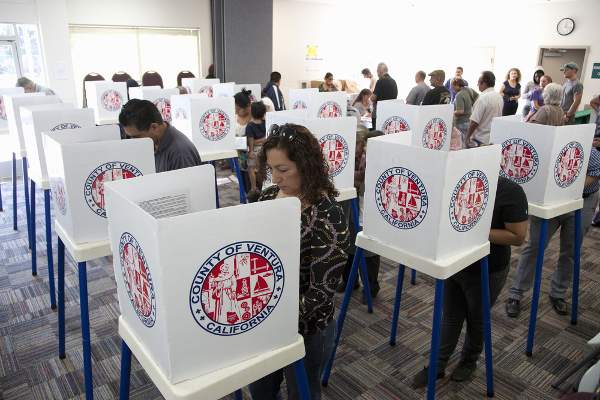
PHOTO/JOSEPH SOHM
State’s “top-two” primary system benefits candidates of the one percent
SACRAMENTO, CA —When Californians adopted the “top-two” primary system in the June 2010 election, they were confident it would strengthen democracy. That’s what they’d been told.
What they hadn’t been told was that the measure was being bankrolled by some of the state’s biggest corporations, among them Chevron, Wal-Mart, Oracle, Intel, General Electric, and PG&E.
Nor had they been told that some of the state’s richest men were also behind it— billionaires like Jerry Perenchio (Univision), Reed Hastings (Netflix), developer Eli Broad (Kaufman and Broad), and broker Charles Schwab.
Only veteran Sacramento watchers were aware that the corporations were hiding their support by funneling contributions through Governor Arnold Schwarzenegger’s political slush fund, the “California Dream Team.”
Californians probably also did not realize that they were voting to end their chance to vote for write-in candidates in the general election—and that they would probably never again see California’s array of “third parties” on a November ballot.
In fact, the people of California were being conned into undermining their own democracy and remaking their electoral system to best serve the interests of the richest one percent.
Under the new system, every candidate for state or federal office (excepting president) runs in the same, “open” primary in the June election, regardless of party. Only the top-two vote getters go on the November ballot.
Through their front groups, the big-business supporters of the “top-two” system told Californians it would give independent voters a voice in the primaries and give non-traditional parties a better chance to win.
But what they told each other was that it would assure that only “moderate” candidates would end up on November ballots. That’s “moderate” as in pro-corporate and pro-capitalist — the candidates of, by, and for the one percent.
LA political godfather Eli Broad explained his $100,000 donation saying, “I’m a lifelong Democrat, but I’m a centrist.” He wanted to limit the labor movements strength in elections, he said.
Grassroots electoral-reform organizations opposed the scheme. The California League of Conservation voters reasoned that it would “shut out participation by minor parties and make it more difficult for alternate political views to have a place in the general-election discussion.”
And that has happened. Californians won’t find Green, Libertarian, Peace and Freedom, or American Independent candidates for state or federal offices on their November ballots. And they won’t be able to write anybody in then, either.
How the one percent got the state’s voters to undermine their own democracy came down to their ability to throw millions of dollars into the political system. In 2010, they raised more than $16 million and flooded the media with ads. Campaign committees opposing Prop. 14 raised only $300,000.
As economic conditions worsen, the one percent seems to fear deeply that candidates of, by, and for the 99 percent can win. And then they could expand political democracy into economic democracy— and run the economy for the good of all.
